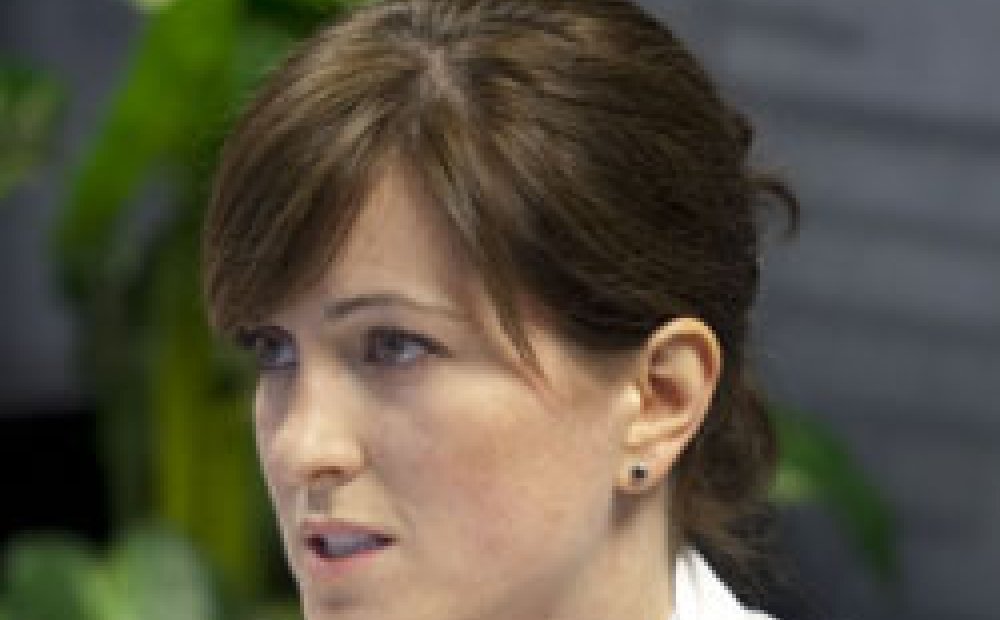Whose Logo? Sustainable Consumption and Production in North America

Stefanie Bowles, Policy Horizons Canada
The role of government as a regulating body in certifying green labels and standards is in decline, said Stefanie Bowles at an event hosted by the Canada Institute. Bowles discussed the findings of her research examining the economic and social implications of the steady rise of products claiming to be "green." Bowles' presentation shed light on a changing regulatory structure, the difficulties of defining "green," and the unclear role of government in a consumer-led environment.
A Changing Regulatory Structure
A more socially and environmentally conscious population has been the driving force behind the rise of green claims and labels used by a growing number of companies in North America, said Bowles. While government has traditionally served as the primary means of enforcing and setting product standards, its role has been reduced in recent years, she said. The reduced role stems from the democratization of information, the rise of complex global trade regimes, the speed of private sector technological innovation, and the emergence of new generators of marketplace legitimacy.
The declining regulatory role of government has been met with the rise of an emerging green consumer-based system. Bowles pointed to the increasing use of non-government labels aiming to inform the consumer of sound environmental and socially responsible practices during the lifecycle of a product. Bowles maintained that green demands from consumers are forcing companies to adhere to informal market-led requirements as well as formal regulations.
Such market-led standards have resulted in a wide range of "green" labels that are often frustrating and confusing for would-be consumers. Bowles pointed out that there are more than 160 eco-certification programs based in the United States and Canada alone. While there are great opportunities for innovation in this new voluntary standards environment, Bowles cautioned that there is now a need to operate and compete under both the old and new regulatory structures. She pointed out that this imperative is even greater for both Canada and the United States because of their tight trade relationship and consequent need to harmonize standards.
Challenges to Building Legitimacy
Bowles discussed some of the challenges faced by green logos. She urged the audience to conceive of a product as embodying a bundle of green values, including direct environmental inputs such as energy, water, and chemicals, but also less direct inputs such as animal testing, wages, and labor conditions. She maintained that the visibility of these values is a relatively recent phenomenon and that consumers are struggling with the decisions and value judgments they must make in the selection of one product over another.
Bowles discussed Life Cycle Assessment (LCA), describing it as a methodology for estimating the comprehensive environmental burdens and impacts of a product from the beginning of its production through to its final disposal. She noted that Energy Star, the most recognized green product logo in North America, only measures the impact of a product during its use phase. Other stages of the life-cycle, such as resource extraction, manufacturing, and disposal, are not assessed in Energy Star certification. Bowles concluded that the Energy Star program is not comprehensive and does not address deeper green issues. Moreover, given today's global supply chains, there is still no actor or set of actors in a position to know the full environmental and social impact of a product throughout its life-cycle. Bowles maintained that we do not currently possess the global infrastructure to support broad-based green claims.
What Is the Role of Government?
While it is no longer the exclusive responsibility of government to set standards for products, Bowles cautioned against an excessive distancing of government from the consumer-led regulatory process. She concluded with several suggestions for the governments of Canada and the United States:
- Bring voluntary standards bodies into an accountable public realm by regulating the green certifiers or establishing a set of North American (or global) public institutions;
- Standardize globally the communication of disparate environmental and social information using the International Organization for Standardization and its Environmental Product Declaration (EPD) system;
- Synchronize North American regulation for the development of a carbon/environmental footprint label.
Several themes were discussed in a productive discussion period following the presentation. The role of large brands with big identities in setting standards was highlighted. In response to a concern expressed over the small percentage of businesses currently willing to commit to voluntary regulation, Bowles noted the increasing need for consumers to act as concerned global citizens and to demand green practices from more businesses.
Responding to a question regarding the demand for regulatory oversight in the process of voluntary standard setting, Bowles said that voluntary standards bodies are "where the action is"—there seems to be little need or demand for governmental policing. The event concluded with Bowles wondering aloud about the potential roles regulators could play in the next decade.
Drafted by Aengus Bridgman, Program Intern
David Biette, Director, Canada Institute
Speaker
Hosted By

Canada Institute
The mission of the Wilson Center's Canada Institute is to raise the level of knowledge of Canada in the United States, particularly within the Washington, DC policy community. Research projects, initiatives, podcasts, and publications cover contemporary Canada, US-Canadian relations, North American political economy, and Canada's global role as it intersects with US national interests. Read more


Environmental Change and Security Program
The Environmental Change and Security Program (ECSP) explores the connections between environmental change, health, and population dynamics and their links to conflict, human insecurity, and foreign policy. Read more
